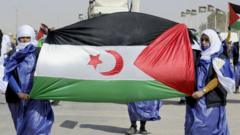In a significant diplomatic shift, the UK has officially endorsed Morocco's autonomy plan for the disputed territory of Western Sahara. Historically, British governments have maintained a neutral position on the issue, which is identified by the United Nations as a "non-self-governing territory." However, during a visit to the Moroccan capital, Rabat, UK Foreign Secretary David Lammy announced the new backing for Morocco's proposal, which allows for self-governance in Western Sahara while maintaining Moroccan sovereignty.
UK Endorses Moroccan Autonomy Plan for Western Sahara Amid Investment Prospects

UK Endorses Moroccan Autonomy Plan for Western Sahara Amid Investment Prospects
The UK shifts its stance on Western Sahara, backing Morocco's autonomy proposal in exchange for business opportunities related to the upcoming World Cup.
Lammy described Morocco's autonomy plan as "the most credible, viable and pragmatic basis for a lasting resolution of the dispute." His visit coincided with the signing of agreements focused on enhancing bilateral cooperation, particularly in light of Morocco's role in hosting the 2030 men's football World Cup alongside Spain and Portugal. The agreements are aimed at attracting British investment in key infrastructure projects. Lammy highlighted the opportunity for "British businesses to score big on football's biggest stage."
Algeria, which supports the Western Saharan independence movement, expressed regret over the UK's stance, stating that Morocco's proposal has not been a basis for negotiation with the Sahrawi people. The territory, rich in natural resources, has been a contested region since it was a Spanish colony, leading to decades of conflict. Although Morocco controls a significant portion of Western Sahara, the armed group Polisario Front continues to advocate for the independence of the Sahrawi people.
The African Union supports the recognition of Western Sahara's right to self-determination, and several countries, including the US, Spain, and Germany, have also leaned towards Morocco's claim in recent years. UK diplomats noted that the recent endorsement came with conditions, including Morocco's renewed commitment to self-determination principles, a revised autonomy plan, and the re-initiation of negotiations.
In a joint communique, both nations reaffirmed their commitment to resolving conflicts without employing force and respecting self-determination principles. This marks a notable policy shift for the UK, which previously described the status of Western Sahara as "undetermined" and supported self-determination for its people.
Morocco's Foreign Minister, Nasser Bourita, hailed the UK's endorsement as a historic milestone in their long-standing relationship, referring to it as a substantial move towards a definitive solution to the dispute. Lammy emphasized that the partnership agreements would bring direct benefits for British businesses and support the UK's construction sector, enhancing economic ties between the two nations.
Historically marked by conflicts in the 1970s and 1980s, the situation in Western Sahara has seen various ceasefires but remains unresolved to this day, with a long-envisaged UN-brokered referendum on the territory's future still pending since the deployment of peacekeepers in the region in 1991.
Algeria, which supports the Western Saharan independence movement, expressed regret over the UK's stance, stating that Morocco's proposal has not been a basis for negotiation with the Sahrawi people. The territory, rich in natural resources, has been a contested region since it was a Spanish colony, leading to decades of conflict. Although Morocco controls a significant portion of Western Sahara, the armed group Polisario Front continues to advocate for the independence of the Sahrawi people.
The African Union supports the recognition of Western Sahara's right to self-determination, and several countries, including the US, Spain, and Germany, have also leaned towards Morocco's claim in recent years. UK diplomats noted that the recent endorsement came with conditions, including Morocco's renewed commitment to self-determination principles, a revised autonomy plan, and the re-initiation of negotiations.
In a joint communique, both nations reaffirmed their commitment to resolving conflicts without employing force and respecting self-determination principles. This marks a notable policy shift for the UK, which previously described the status of Western Sahara as "undetermined" and supported self-determination for its people.
Morocco's Foreign Minister, Nasser Bourita, hailed the UK's endorsement as a historic milestone in their long-standing relationship, referring to it as a substantial move towards a definitive solution to the dispute. Lammy emphasized that the partnership agreements would bring direct benefits for British businesses and support the UK's construction sector, enhancing economic ties between the two nations.
Historically marked by conflicts in the 1970s and 1980s, the situation in Western Sahara has seen various ceasefires but remains unresolved to this day, with a long-envisaged UN-brokered referendum on the territory's future still pending since the deployment of peacekeepers in the region in 1991.





















